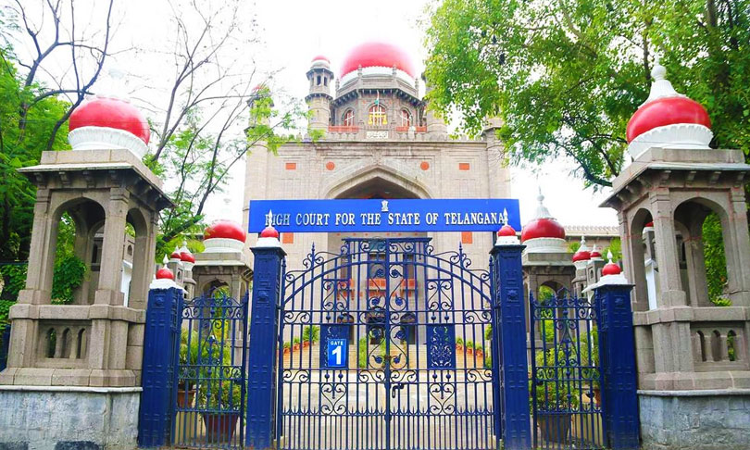- Home
- /
- High Courts
- /
- Telangana High Court
- /
- Telangana HC Acquits Rape Accused...
Telangana HC Acquits Rape Accused Citing “Grand Failure” Of Investigation, Suggests Performance Evaluation System For Cops
Siddhi Nigam
2 May 2025 4:35 PM IST
In a case pertaining to the alleged rape of a woman, the Telangana High Court has acquitted the appellant and criticised the investigative process citing procedural lapses and failure to maintain evidentiary standards, especially concerning scientific evidences. The bench comprising of Justices P.Sam Koshy and N. Tukaramji stated that there was negligent handling of medical evidence from...
In a case pertaining to the alleged rape of a woman, the Telangana High Court has acquitted the appellant and criticised the investigative process citing procedural lapses and failure to maintain evidentiary standards, especially concerning scientific evidences.
The bench comprising of Justices P.Sam Koshy and N. Tukaramji stated that there was negligent handling of medical evidence from the stage of collection, and so drawing conclusions regarding the culpability cannot be done.
“In the matter at hand, while considering the evidence brought onto record, we could discern failure in collecting clinching material to substantiate essential facts and negligent handling of the scientific/medical evidence from the stage of collection of sample, safe chain of custody and drawing conclusions in regard to culpability and into manifestation of incomplete and lackadaisical investigation.”
Further, the court discussed that the greatest victim in this case is criminal justice administration in which the either there is wrongful conviction of the innocent or letting the real culprits go scot-free, which transforms the actual perpetrator into an ongoing threat. The bench highlighted that the 'tunnel-vision approach' by the investigative agencies should be abandoned.
“The investigation agency must abandon the tunnel vision approach, where prematurely centers on the projected suspect without adequately exploring the other relevant aspects and must conduct proceedings strictly in accordance with the prescribed procedures of investigation.”
The Court encouraged the formulation of a performance evaluation system that rates the efficiency and effectiveness of the investigation officers and such linkage will motivate the officers to prioritise investigative excellence.
“When an officer is entrusted with a case he or she should be accountable for the thoroughness and quality of the investigation conducted. Instituting a performance evaluation system that rates the efficiency and effectiveness of the investigating officers based on adherence to produce and the outcomes in the cases they handle, will encourage greater diligence and professionalism. Moreover linking such performance assessments to the officers' career progression and opportunities for advancement would motivate the officers to prioritize investigative excellence. This approach encourages specialization, fosters a culture of accountability and ensures that investigations are conducted with the highest standards of integrity and competence.”
The case concerns a complaint filed by the victim. The appellant (accused) was a senior administrative officer at DRDO who was a close acquaintance of the victim's mother. When the victim was alone, the accused had stayed over and allegedly sexually assaulted her. The victim reported the case later when her pregnancy was disclosed after three months.
The prosecution contended that the appellant took advantage of the trust placed in him and the case proceeded towards trial based on the testimony of the victim and circumstantial evidence. The technical aspects of the DNA test proved inconclusive due to no amplifiable DNA yield which does not diminish the strength of other evidence, especially the victim's testimony and medical report of pregnancy. The trial court had convicted the accused.
On appeal, the high court analysed the inconsistencies in the prosecution's case as the appellant presented a sterilisation certificate proving that he had undergone vasectomy, leading to a doubt on the pregnancy tests. The doctor who conducted the abortion was not examined, and the fetal sample sent to the forensic laboratory was so putrefied that no DNA analysis could be performed.
The High Court highlighted that a conviction in such a serious case has to meet the rigorous standards of evidences and relied on various cases such as Vimal Suresh Kamble v. Chaluverapinake Apal and Krishan Kumar Malik v. State of Haryana.
The bench suggested that regular and rigorous training programs tailored to investigative skills, forensic techniques and legal procedures must be institutionalized and establishing an independent supervising mechanism to monitor investigation quality and provide constructive feedback can further enhance the transparency and public confidence in the criminal justice system.
“This Bench is of the considered view that these measures would significantly enhance standards and outcomes of police investigations. Thus the appropriate governments shall consider recognizing the investigating institutions with defined goals, for securing the fundamental rights of the citizen for fair, impartial and prompt investigations for achieving more effective and just legal system.”
The court concluded by stating that there is an expectation of proactive engagement and affirmative and decisive action from all involved in the investigating agencies.
Case Title: Colonel Rishi Sharma vs. The State of Telangana
Case No: CRIMINAL APPEAL No.946 of 2024



